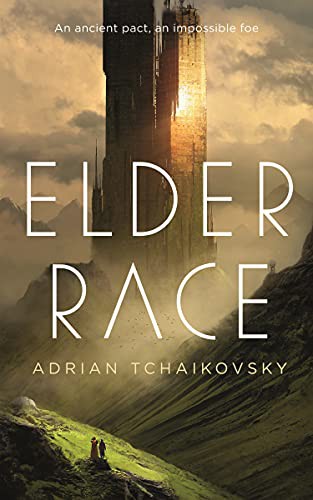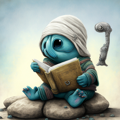Phil in SF reviewed Elder Race by Adrian Tchaikovsky
Lonely wizard in the tower impresses non-magical local woman
4 stars
Here's the premise: Humans explore space, establishing settlements across the galaxy. Something happens, and all the settlements are on their own for hundreds of years. Many devolve to pre-industrial states without connection to other settlements. A revived Earth sends out research missions to all the settlements with a Prime Directive like instruction to observe but not interfere. But then something happens again and all the research missions lose contact with Earth, stranding researchers, who have access to life-extending health technology as well as other machines not available to local settlements.
Nyr is the stranded anthropologist. Lynesse, aka Lyn, is local settlement royalty, but is the 4th, and least important daughter. A corruption starts defeating outlying kingdoms. Royalty doesn't care much because they are outlying. Lynesse sees a bigger danger, and sets off to find the wizard of legend (Nyr) to convince him to help. Isolated and lonely, he agrees.
The …
Here's the premise: Humans explore space, establishing settlements across the galaxy. Something happens, and all the settlements are on their own for hundreds of years. Many devolve to pre-industrial states without connection to other settlements. A revived Earth sends out research missions to all the settlements with a Prime Directive like instruction to observe but not interfere. But then something happens again and all the research missions lose contact with Earth, stranding researchers, who have access to life-extending health technology as well as other machines not available to local settlements.
Nyr is the stranded anthropologist. Lynesse, aka Lyn, is local settlement royalty, but is the 4th, and least important daughter. A corruption starts defeating outlying kingdoms. Royalty doesn't care much because they are outlying. Lynesse sees a bigger danger, and sets off to find the wizard of legend (Nyr) to convince him to help. Isolated and lonely, he agrees.
The story follows them in their journey, alternating points of view between Nyr and Lynesse. To him, it's just technology. To her, it's magic. They struggle to connect, and both struggle to understand if they have a chance to defeat a demon made of stuff that is unknown to both of them.
On the one hand, it's a lovely story of people trying to, and ultimately, coming together. And I mostly relate to it on that level. But also, there's a germ of ick at a dude who uses a vast power difference to be the impressive cool wizard. Tchaikovsky does a pretty good job of threading the needle so that Lynesse is both able to be impressed and also together enough not be be naive about the ancient wizard.









